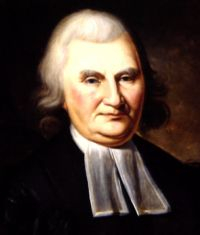
John Witherspoon, if he is known at all, is known in America for being one of the signers of the Declaration of Independence. Prior to emigrating to the colonies to assume the presidency at Princeton, he was a well known pastor in Scotland. While in Scotland, he was undoubtedly best known for his book Ecclesiastical Characteristics (1753), a devastating piece of satire aimed at the Moderate Party in the Kirk. Witherspoon lampooned their high manners and cool rationalism. The most famous section in Ecclesiastical Characteristics is Witherspoon’s mock statement of faith which he called “The Athenian Creed.”
I believe in the beauty and comely proportions of Dame Nature, and in almighty Fate, her only parent and guardian; for it hath been most graciously obliged (blessed be its name) to make us all very good.
I believe that the universe is a huge machine, wound up from everlasting by necessity, and consisting of an infinite number of links and chains, each in a progressive motion towards the zenith of perfection, and meridian of glory; that I myself am a little glorious piece of clock-work, a wheel within a wheel, or rather a pendulum in this grand machine, swinging hither and thither by the different impulses of fate and destiny; that my soul (if I have any) is an imperceptible bundle of exceeding minute corpuscles, much smaller than the finest Holland sand; and that certain persons, in a very eminent station, are nothing else but a huge collection of necessary agents who can do nothing at all.
I believe that there is no ill in the universe, nor any such thing as virtue absolutely considered; that those things vulgarly called sins are only errors in the judgment, and foils to set off the beauty of Nature, or patches to adorn her face; that the whole race of intelligent beings, even the devils themselves (if there are any) shall finally be happy; so that Judas Iscariot is by this time a glorified saint, and it is good for him that he hath been born.
In sum, I believe in the divinity of L. S—–, the saintship of Marcus Antoninus, the perspicuity and sublimity of A—–e, and the perpetual duration of Mr H—–n’s works, notwithstanding their present tendency to oblivion. Amen.
Witherspoon was a good writer, with quite a good sense of humor. Interested students or pastors would benefit from his Selected Writings (edited by Thomas Miller), which include Ecclesiastical Characteristics.



